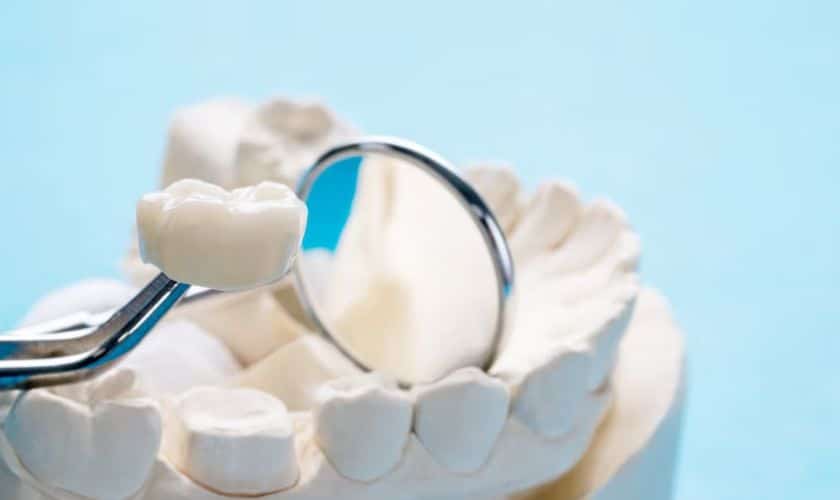
Dental crowns are an excellent solution for restoring and protecting damaged teeth. They not only enhance your smile but also ensure the functionality of your teeth. However, proper care is essential to maintain your dental crown’s longevity and appearance.
Whether you’ve recently had dental crowns in Brookhaven, GA, or have had one for years, here’s a complete guide to keeping it in tip-top shape.
Do’s for Dental Crown Maintenance
1. Brush and Floss Daily
Good oral hygiene is the foundation of dental crown care. Regular brushing and flossing will keep your crown looking great and protect the surrounding teeth and gums from decay or infection.
- Use a soft-bristled toothbrush to prevent scratching the crown’s surface.
- Choose a non-abrasive toothpaste, as harsh formulas can dull the finish on certain types of crowns.
- Floss gently, especially around the base of the crown, to remove food particles and plaque that can lead to gum disease.
2. Rinse with Mouthwash
Using an alcohol-free mouthwash can further reduce bacteria and maintain healthy gums around your crown. Alcohol-based mouthwashes can weaken the adhesive that holds your crown in place, so always read the label before choosing a product.
3. Wear a Mouthguard
If you grind your teeth at night (a condition known as bruxism) or play sports, wearing a custom mouthguard can be a crown-saver. Teeth grinding can put pressure on your crown, leading to wear, cracks, or even loosening. A well-fitted guard can protect both your crown and natural teeth from damage.
4. Visit Your Dentist Regularly
Routine dental check-ups every six months are vital for maintaining your crown’s condition. Your dentist will inspect your crown for any signs of wear, ensure proper adhesion, and clean difficult-to-reach areas. Regular visits also help detect any underlying issues, such as gum recession or cavities near the crown.
Don’ts for Dental Crown Maintenance
1. Don’t Chew Hard or Sticky Foods
While dental crowns are durable, they’re not indestructible. Avoid foods that could potentially damage or dislodge your crown, such as:
- Hard candies
- Ice cubes
- Popcorn kernels
- Sticky caramels or taffy
Chewing these items can crack the crown or weaken the cement that holds it in place. Opt for softer foods and always chew carefully.
2. Don’t Ignore Sensitivity or Pain
If you feel sensitivity, discomfort, or pain in or around your crowned tooth, don’t brush it off. While minor sensitivity after placement is normal, prolonged discomfort could indicate underlying issues, such as an ill-fitting crown, tooth decay, or gum problems. Schedule a dental appointment as soon as possible to address it.
3. Don’t Use Your Teeth as Tools
Teeth, including crowned teeth, should never double as tools to open packages, bottles, or other hard objects. These actions place excessive pressure on the crown and can lead to chips, cracks, or even dislodgement.
4. Don’t Skip Dental Care After a Temporary Crown is Placed
If you’re waiting for your permanent crown to be made, don’t neglect the temporary one. Temporary crowns are less durable, so avoid foods that are too sticky or hard, and follow your dentist’s care instructions closely.
Additional Maintenance Tips
1. Practice Immediate Damage Control if Necessary
Accidents happen. If your crown becomes chipped, cracked, or falls out, contact your dentist immediately. While waiting for your appointment:
- Avoid chewing on that side of your mouth.
- Rinse your mouth with warm salt water to prevent infection.
- Store a dislodged crown in a safe container to show your dentist. Under no circumstances should you attempt to reattach the crown with glue or other adhesives!
2. Maintain Healthy Gums
The health of your gums plays a critical role in your crown’s longevity. If your gums start to recede, the border of your crown could become exposed, making it more susceptible to decay. Brush and floss carefully to keep your gums free from inflammation or infection.
3. Know When to Replace a Crown
While crowns can last a decade or more with proper care, they’re not permanent fixtures. Over time, normal wear, changes in the surrounding teeth, or gum recession may warrant a replacement. Regular dental visits will help determine when it’s time for an upgrade.
Conclusion
Caring for your dental crown doesn’t have to be complicated. A combination of good oral hygiene, mindful habits, and regular dental check-ups is all it takes to keep your crown in excellent condition. By following these do’s and avoiding the don’ts, you can enjoy a durable and beautiful crown for years to come.
If you’re ever in doubt or have questions about your dental crown, don’t hesitate to ask your dentist. A little effort goes a long way in preserving your investment and maintaining a confident, healthy smile!




